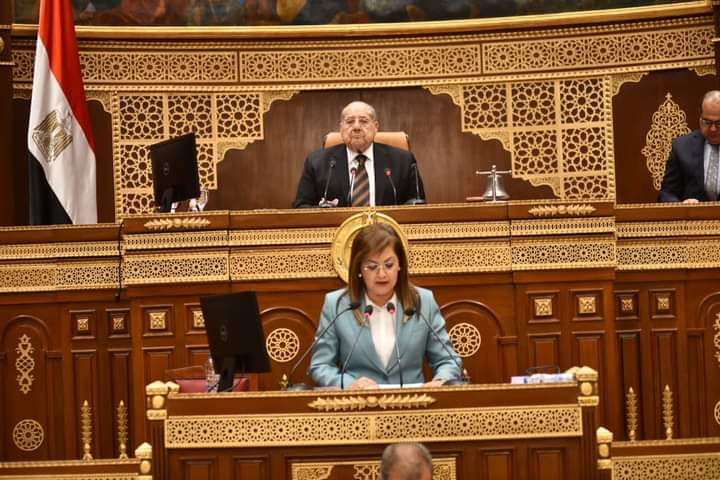Dr. Hala Al-Saeed, Minister of Planning and Economic Development, delivered a statement on the draft economic and social development plan for the fiscal year 24/2025. Before the Senate, headed by Counselor Abdel Wahab Abdel Razek, Chairman of the Council, and in the presence of Dr. Ahmed Kamali, Deputy Minister of Planning and Economic Development, Dr. Jamil Helmy, Assistant Minister for Sustainable Development Plan Follow-up Affairs, Major General Muhammad Al-Jabali, Advisor to the Minister for Political Communication, Dr. Heba Mogheib, Supervisor of the Sector Regional Planning, Ismail Youssef, Supervisor of the Plan Preparation and Follow-up Sector, and the Council members.
During the statement, Dr. Hala Al-Saeed reviewed the basic features of the economic and social development plan for the year 2024/2025, explaining that the efforts aimed at achieving sustainable development revolve around three main goals, complementary in their dimensions and basic elements, which are achieving sustainable economic growth and maintaining high levels of employment. Unemployment rates are reduced to the lowest possible extent, a comprehensive social umbrella is provided for all members of society, and protection is achieved, especially for low-income groups.
Al-Saeed stressed the keenness of next year’s plan to mobilize efforts and focus on projects that support the achievement of these goals.
Al-Saeed added that the draft plan took into account support for the serious efforts and reforms that the state continues to implement to enhance the resilience of the Egyptian economy in the face of crises and seek to seize the potential opportunities to overcome them while addressing internal challenges, by developing the necessary government policies and programs to address crises, confront challenges, and accelerate the wheel of comprehensive and sustainable growth.Al-Saeed pointed out the achievement of a set of priority development goals within the framework of the updated Egypt Vision 2030, by expanding public spending on human development (health, education, and scientific research), in accordance with constitutional entitlements, and including enhancing the availability of health services, and gradually expanding the insurance system. Comprehensive health care to cover all governorates, and to continue improving the educational system, in addition to enriching cultural and sports life, ensuring water and food security, providing safe and sustainable transportation systems, promoting spatial and local development, building the digital and knowledge economy, and shifting towards a green economy.
It also emphasized expanding the umbrella of social protection to include the most vulnerable groups, taking into account the efficient distribution of public investments at the local level in accordance with the development equation that takes into account the development gaps between governorates, in addition to implementing the second phase of the Decent Life initiative aimed at improving the living conditions of rural families.
Al-Saeed discussed continuing the effective implementation of the structural reforms adopted by the government program, which gives priority to driving growth in the agricultural and industrial commodity sectors, and productive services such as communications and information technology, in addition to the sectors in which Egypt enjoys competitive advantages, most notably tourism and logistics. .
Al-Saeed continued, pointing to the commitment to rationalize all aspects of public spending, the move to raise the efficiency of public investment spending and increase its effectiveness in maximizing economic and social returns, and to continue applying program budgeting, performance, and return and cost standards for the implemented projects.
Al-Saeed pointed out that the state has also taken all necessary measures to stimulate private sector participation in investment, and accelerate the pace of economic growth and employment, especially after the announcement of the state ownership policy document, and the increasing trend to stimulate private sector participation, and strengthen the role of Egypt’s Sovereign Fund for Investment and Development in this field.
Al-Saeed also discussed the state’s tendency to target inflation, especially with the government’s efforts and movements to control commodity prices in the markets, expand the provision of goods distribution outlets at reduced prices, and support the structural reforms plan that focuses on sectors of the real productive economy.
Al-Saeed continued talking about the features of the plan, which includes continuing to raise employment levels, explaining that the plan aims to provide about 900,000 additional job opportunities in various commodity and service sectors, which allows for raising the rate of participation in economic activity and reducing the unemployment rate.


